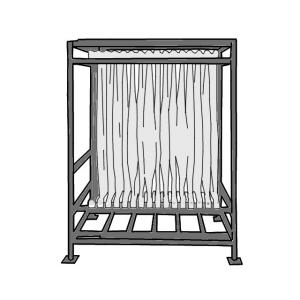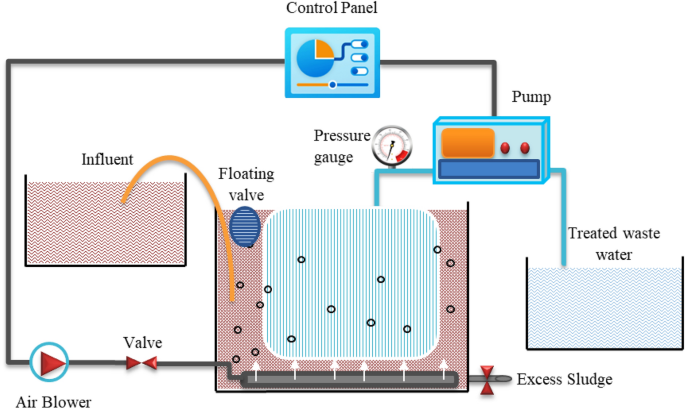Membrane Bioreactor vs. Traditional Treatment Methods: Key Differences Explained
Membrane Bioreactor vs. Traditional Treatment Methods: Key Differences Explained
Blog Article
The Benefits of Membrane Layer Bioreactors in Lasting Wastewater Monitoring
Membrane layer bioreactors (MBRs) stand for an essential improvement in sustainable wastewater administration, efficiently combining biological therapy with innovative membrane filtering technology. As the need for lasting options increases, exploring the multifaceted benefits of MBRs might reveal unexpected implications for the future of wastewater treatment systems.
Introduction of Membrane Layer Bioreactors
Membrane bioreactors (MBRs) represent a significant development in wastewater treatment technology, incorporating organic degradation with membrane layer purification to enhance the performance of the treatment procedure. This innovative system integrates the advantages of standard triggered sludge processes with membrane layer innovation, enabling improved solid-liquid splitting up. MBRs make use of semi-permeable membranes to separate cured water from biomass, causing top quality effluent that can be recycled or safely discharged into the environment.
The operational design of MBRs typically entails a bioreactor where microbes damage down organic matter, followed by a membrane layer system that filters the combined alcohol. This configuration not just minimizes the impact of the treatment center yet also permits higher biomass focus and decreased hydraulic retention times. Moreover, MBRs can treating a bigger series of pollutants, including virus and nutrients, making them appropriate for numerous applications, from municipal wastewater therapy to commercial effluent processing.
The integration of MBRs right into wastewater monitoring systems is indicative of an expanding trend towards sustainable and efficient practices in ecological engineering. Their capability to generate high-grade effluent while lessening space demands settings MBR modern technology as a key gamer in modern wastewater treatment solutions.
Enhanced Effluent High Quality

The membrane filtration procedure acts as a physical barrier, enabling the retention of bacteria and particle issue, which contributes to a more clear and cleaner effluent (Membrane Bioreactor). In addition, MBRs run at greater biomass focus than traditional triggered sludge systems, advertising extra reliable biodegradation of contaminants. This leads to a reduction in biochemical oxygen need (BODY) and overall put on hold solids (TSS) degrees in the final effluent
Furthermore, MBRs show superb efficiency in dealing with tough wastewater compositions, such as industrial effluents and wastewater with high nutrient lots. Because of this, the effluent generated is commonly of better, enabling even more versatile disposal alternatives and minimized ecological influence. Eventually, the boosted effluent quality accomplished with MBR innovation emphasizes its crucial duty beforehand sustainable wastewater monitoring techniques.
Water Reuse Opportunities
The premium effluent produced by membrane bioreactors (MBRs) opens significant chances for water reuse in various applications. MBRs effectively get rid of contaminants, consisting of pathogens, put on hold solids, and natural issue, leading to treated water that satisfies or exceeds governing requirements for reuse. This high quality enables the application of water reusing initiatives across varied fields.
One famous application remains in agriculture, where treated wastewater can be used for watering, promoting sustainable farming web methods while conserving fresh water resources. Furthermore, MBR-treated effluent can be made use of for industrial processes such as air conditioning, cleansing, and as a process water source, dramatically decreasing the demand for potable water in these operations.
In metropolitan atmospheres, MBRs facilitate the use of recovered water for landscape irrigation, commode flushing, and various other non-potable usages, adding to the total durability of supply of water systems. The combination of MBR technology in decentralized systems aids in handling local water needs, particularly in water-scarce areas.
Reduced Ecological Influence
How can the fostering of membrane bioreactors (MBRs) add to a reduced environmental effect in wastewater administration? MBRs substantially boost the treatment effectiveness of wastewater while decreasing eco-friendly disruptions. Membrane Bioreactor.
Additionally, MBRs run at lower hydraulic retention times contrasted to standard systems, resulting in smaller treatment plant footprints. This compact layout minimizes land use, consequently preserving all-natural environments and biodiversity. The procedure also creates less sludge than standard approaches, reducing disposal difficulties and reducing greenhouse gas emissions connected with sludge administration.
Additionally, MBRs assist in the recuperation of valuable resources, such as water and nutrients, contributing to a circular economic situation. By enabling water reuse for irrigation or commercial procedures, MBRs aid ease freshwater scarcity, therefore promoting sustainable water utilize methods. Eventually, the adoption of MBR technology stands for a considerable stride towards minimizing the ecological effect of wastewater administration systems.
Economic Advantages of MBRs

In addition, MBRs assist in the manufacturing of high-quality effluent, which can be recycled for various applications, such as agricultural watering and commercial procedures - Membrane Bioreactor. This reuse ability can dramatically reduce water procurement prices, supplying a monetary incentive for markets facing rigorous water laws
The portable style of MBR systems also results in minimized land requirements, which is especially beneficial in city locations where realty is expensive. By reducing space, markets and towns can minimize land acquisition and upkeep expenditures.
Additionally, MBRs usually require less regular upkeep and have a longer life-span than typical systems, better contributing to cost financial savings. In recap, the economic advantages of MBRs-- varying from reduced functional expenses to land cost savings and effluent reuse-- make them a compelling choice for sustainable wastewater management, providing both long-lasting and immediate financial advantages.
Verdict
Membrane bioreactors represent a transformative method to lasting wastewater administration, integrating organic treatment with advanced membrane filtration for superior effluent high pop over to this site quality. Their ability for reliable contaminant removal promotes water reuse, thereby preserving vital freshwater resources. In addition, MBRs add to reduced ecological influences with compact layouts and reduced sludge generation. Economic benefits even more improve their practicality, making MBRs an encouraging option for dealing with the challenges of wastewater therapy and promoting sustainable resource administration.
Membrane layer bioreactors (MBRs) stand for a critical development in lasting wastewater administration, properly merging biological therapy with advanced membrane purification innovation.Membrane bioreactors (MBRs) represent a significant innovation in wastewater treatment innovation, integrating organic deterioration with membrane filtering to enhance the effectiveness of the treatment procedure.Attaining boosted effluent top quality is one of the most substantial benefits of utilizing membrane layer bioreactors (MBRs) in wastewater therapy.Additionally, you can look here MBRs demonstrate superb efficiency in dealing with tough wastewater compositions, such as commercial effluents and wastewater with high nutrient loads.Integrating membrane layer bioreactors (MBRs) right into wastewater management not just decreases environmental impact however additionally offers considerable financial advantages.
Report this page